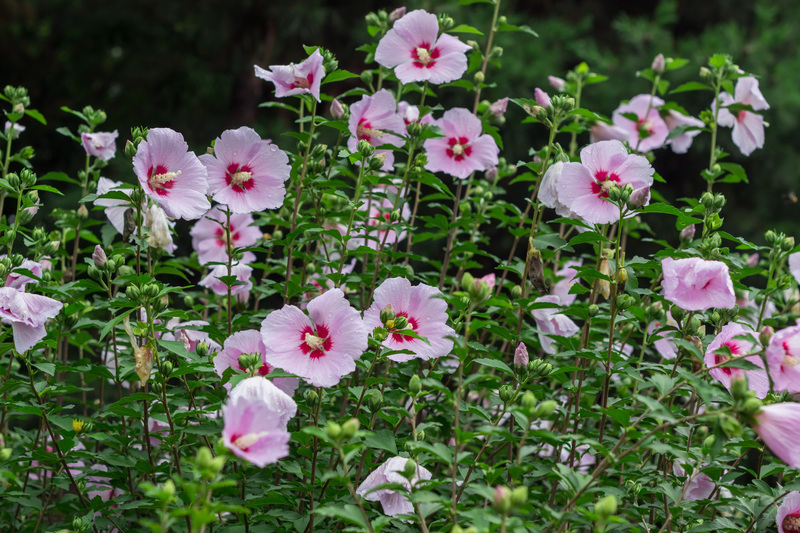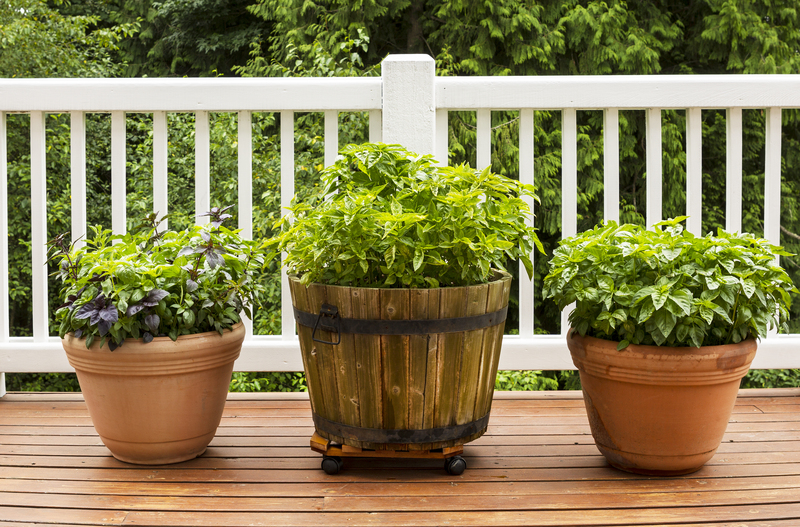Nurture nature: the ultimate guide to planting a herb garden
Posted on 16/08/2025
Nurture Nature: The Ultimate Guide to Planting a Herb Garden
Are you looking to bring nature closer to home and enjoy the rewards of fresh, aromatic herbs at your fingertips? Starting a herb garden is a wonderful way to nurture the environment while enhancing your culinary creations. Whether you are a seasoned gardener or a beginner with limited space, this ultimate guide to planting a herb garden will equip you with everything you need to know to create your own flourishing paradise of greens and fragrance.
Why Choose to Grow a Herb Garden?
Planting herbs is about more than just adding fresh flavors to your meals. By cultivating your own garden, you:
- Reduce food miles and carbon footprint
- Attract pollinators like bees and butterflies
- Benefit from naturally clean air and a more eco-friendly lifestyle
- Save money on buying packaged herbs
- Enjoy the therapeutic and stress-relieving effects of nurturing plants
If you've ever wondered how to plant a thriving herb garden, look no further! This article covers every step from preparation to harvest.

Planning Your Herb Garden: Key Considerations
1. Selecting the Right Location
- Sunshine is Essential: Most herbs need at least six hours of direct sunlight daily. Look for a spot that receives abundant light.
- Accessibility: Pick a convenient location--herbs are used often, so plant them close to the kitchen or patio.
- Good Drainage: Herb roots dislike soggy soil. Raised beds, containers, or well-draining garden patches work best.
2. Deciding Between Containers or In-Ground Gardening
- Container Herb Gardens: Perfect for balconies, patios, and small spaces.
- In-Ground Herb Beds: Ideal for gardens with available land and good soil quality.
- Vertical gardens or wall-mounted planters are innovative options for urban dwellers.
3. Choosing Your Herbs
- Beginner-Friendly Herbs: Basil, parsley, mint, chives, oregano, thyme, rosemary, and sage are easy and resilient.
- Consider your culinary preferences: Choose herbs you'll use the most.
- Companion planting: Some herbs grow better together and even protect each other from pests.
Preparing Your Space: Soil, Containers, and Tools
1. The Importance of Soil Quality
- Well-Draining Soil: Most herbs thrive in light, loose, and well-drained soil. Consider adding compost to increase fertility.
- pH Level: Aim for a neutral pH (6.0 to 7.0), which is suitable for most herb varieties.
- Enrich with Organic Matter: Mix in aged manure or compost for nutrients and moisture retention.
2. Best Containers for Herbs
- Clay Pots: Provide excellent breathability but require more frequent watering.
- Plastic or Glazed Ceramic: Retain moisture longer; good for hot, dry climates.
- Size Matters: Choose containers at least 6 inches deep and wide enough for root growth.
- Ensure drainage holes at the bottom to prevent root rot.
3. Essential Tools for Herb Gardening
- Hand trowel and pruners
- Watering can with a fine nozzle
- Gardening gloves
- Organic fertilizer and mulch
- Labels or markers for your herbs
How to Plant a Herb Garden: Step-by-Step Guide
1. Starting from Seeds vs. Seedlings
- Seeds: Cost-effective, offer more variety. Sow indoors 6-8 weeks before the last frost, or directly into the soil or containers after danger of frost passes.
- Seedlings: Easier and quicker; purchase healthy young plants from a reputable nursery.
2. Planting Your Herbs
- Prepare your soil or pot: Loosen the soil and mix in compost. Fill containers with potting soil formulated for herbs or vegetables.
- Arrange your herbs: Group those with similar water and sunlight requirements together.
- Spacing: Give each plant enough space--typically 6-12 inches apart, depending on the herb.
- Plant with care: Gently remove seedlings from their pots. Place in soil at the same depth as before, and firm the soil around the roots.
- Water thoroughly after planting, and add a thin layer of mulch to retain moisture.
Caring for Your Herb Garden: Maintenance Tips
1. Watering Strategies
- Moderation is key: Overwatering can lead to root rot. Let the soil dry somewhat between waterings.
- Container herbs may need more frequent watering, especially in hot weather.
- Morning hours are ideal for watering to minimize evaporation and avoid fungal diseases.
2. Fertilizing for Optimal Growth
- Use organic fertilizer: Apply a diluted, balanced liquid fertilizer every few weeks during the growing season.
- Avoid over-fertilizing, which can reduce flavor in some herbs like basil and thyme.
3. Pruning, Pinching, and Harvesting
- Regularly pinch back growing tips to encourage bushy growth and prevent herbs from flowering too soon.
- Harvest leaves frequently, especially from the top, to promote continual new growth.
- Prune woody herbs like rosemary and thyme in early spring to maintain shape and vitality.
4. Managing Pests and Diseases -- Naturally
- Companion planting: Certain combinations repel pests or attract beneficial insects.
- Organic remedies: Neem oil, insecticidal soap, and hand-picking help manage common pests.
- Rotate and clean containers each season to prevent soil-borne diseases.
Maximizing Your Herb Garden: Creative Ideas and Advanced Tips
1. Seasonal Rotation and Successive Planting
- Stagger planting dates for a continuous harvest all season long.
- Grow cool-season herbs like parsley, cilantro, and chervil in spring and fall.
- Switch to heat-loving herbs -- basil and oregano -- in the warmth of summer.
2. Indoor Herb Gardens
- Herbs like basil, chives, thyme, and mint thrive on sunny windowsills or under grow lights.
- Water indoor herbs more carefully -- avoid soggy soil and ensure adequate humidity.
- Rotate pots regularly for even sunlight exposure.
3. Preserving and Using Your Herbs
- Dry or freeze excess herbs for use in the off-season.
- Muddle fresh herbs in drinks or blend for herbal butters, oils, and pestos.
- Make herbal teas from mint, lemon balm, and chamomile for health and relaxation.
- Share your harvest with friends, or gift fresh bundles to neighbors.
Troubleshooting Common Herb Garden Challenges
- Yellowing leaves: Usually a sign of overwatering or poor drainage. Amend soil or adjust watering schedule.
- Herbs not thriving: Check for insufficient sunlight, poor soil, or overcrowding.
- Pests like aphids or spider mites: Gently wash leaves or apply organic remedies early.
- Herbs bolting (flowering prematurely): Regularly pinch back tips and harvest to delay flowering.
Sustainability in Your Herb Garden: Going Green
- Compost kitchen scraps and herb clippings to feed your soil naturally.
- Use organic mulch such as straw or bark to reduce water loss and suppress weeds.
- Collect rainwater for irrigation, reducing reliance on municipal sources.
- Avoid chemical pesticides -- promote biodiversity with natural solutions.
Frequently Asked Questions About Herb Gardening
- What is the easiest herb to grow for beginners?
Mint, chives, and parsley are resilient, fast-growing, and forgiving for first-time gardeners. -
How often should I water my herbs?
Let the soil dry slightly between waterings. In containers, check daily in warm weather. -
Can I grow a herb garden indoors all year?
Yes! With enough light--natural or artificial--many herbs thrive inside, even during winter.

Conclusion: Grow, Nurture, and Enjoy Your Herb Garden
Growing a herb garden is about more than just cultivating plants--it's a way to nurture nature, promote sustainability, and enrich your life with flavor and wellness. With the tips and ideas in this comprehensive guide, you can confidently plan, plant, and care for a flourishing herbal oasis in your home, yard, or balcony. Harvest fresh seasonings and experience the joy of watching your herb garden thrive year-round.
Ready to nurture nature and grow your own herb paradise? Start today, and discover the endless rewards that a vibrant herb garden can bring to your kitchen, health, and the environment!
Quick Herb Planting Checklist
- Choose a sunny, accessible location
- Pick easy-to-grow, versatile herbs
- Prepare well-draining, rich soil
- Space and plant herbs mindfully
- Water and feed as needed
- Prune and harvest for health and growth
- Preserve and enjoy your herbs all year
For more in-depth answers to your herb gardening questions and new ways to nurture nature, browse our other guides and join the growing community of herb lovers worldwide!
Latest Posts
Low Maintenance Garden Hacks for the Thrifty Homeowner
Outdoor Enthusiast's Guide to Essential Tools
Transform small spaces with vertical gardening

